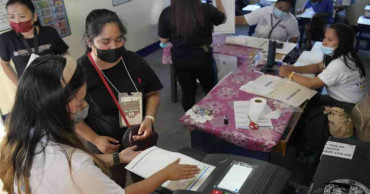Filipinos
Filipino carpenter, nailed to a cross, prays for end to Ukraine war that made poor people poorer
Eight Filipinos were nailed to crosses to reenact Jesus Christ’s suffering in a bloody Good Friday tradition, including a carpenter, who was crucified for the 34th time with a prayer for Russia’s invasion of Ukraine to end because it has made poor people like him more desperate.
The real-life crucifixions in the farming village of San Pedro Cutud in Pampanga province north of Manila resumed after a three-year pause due to the coronavirus pandemic. About a dozen villagers registered but only eight people showed up, including 62-year-old carpenter and sign painter Ruben Enaje, who screamed as he was nailed to a wooden cross with a large crowd watching in the scorching summer heat.
In a news conference shortly after his crucifixion, Enaje said he prayed for the eradication of the COVID-19 virus and the end of Russia’s invasion of Ukraine, which has contributed to gas and food prices soaring worldwide.
"It's just these two countries involved in that war, Russia and Ukraine, but all of us are being affected by the higher oil prices even if we’re not involved in that war,” said Enaje.
Ahead of the crucifixions, Enaje told The Associated Press that the steep increases in oil and food prices after Russia invaded Ukraine made it harder for him to stretch his meager income from carpentry and sign making.
Thousands of people, including foreign tourists, came to watch the annual religious spectacle in San Pedro Cutud and two other nearby rural villages.
Kitty Ennett, a veterinarian from Ireland, said the crucifixions were “a very religious experience” and they were worth the long trip from her home in the United Kingdom.
“When I was seeing the young man doing the flogging and going up to the cross, it’s very moving to see how much they sacrifice for their faith,” Ennett told The AP. “They really put themselves in the shoes of Jesus.”
Enaje survived nearly unscathed when he fell from a three-story building in 1985, prompting him to undergo the ordeal as thanksgiving for what he considered a miracle. He extended the ritual after loved ones recovered from serious illnesses, one after another, turning him into a village celebrity as the “Christ” in the Lenten reenactment of the Way of the Cross.
Ahead of their crucifixion on a dusty hill, Enaje and the other devotees, wearing thorny crowns of twigs, carried heavy wooden crosses on their backs for more than a kilometer (more than half a mile) in the brutal heat. Village actors dressed as Roman centurions later hammered 4-inch (10-centimeter) stainless steel nails through his palms and feet, then set him aloft on a cross under the sun for about 10 minutes.
Other penitents walked barefoot through village streets and beat their bare backs with sharp bamboo sticks and pieces of wood. Some participants in the past opened cuts in the penitents’ backs using broken glass to ensure the ritual was sufficiently bloody.
The gruesome spectacle reflects the Philippines’ unique brand of Catholicism, which merges church traditions with folk superstitions.
Many of the mostly impoverished penitents undergo the ritual to atone for their sins, pray for the sick or for a better life, and give thanks for miracles.
Church leaders in the Philippines have frowned on the crucifixions and self-flagellations, saying Filipinos can show their faith and religious devotion without hurting themselves and by doing charity work instead, such as donating blood.
Robert Reyes, a prominent Catholic priest and human rights activist in the country, said the bloody rites reflect the church’s failure to fully educate many Filipinos on Christian tenets, leaving them on their own to explore personal ways of seeking divine help for all sorts of maladies.
Folk Catholicism has become deeply entrenched in the local religious culture, Reyes said, citing a chaotic annual procession of a black statue of Jesus Christ called the Black Nazarene, which authorities say draws more than a million devotees each January in one of Asia’s largest religious festivals. Many bring towels to be wiped on the wooden statue, believing it has powers to cure ailments and ensure good health and a better life.
“The question is, where were we church people when they started doing this?” Reyes asked, saying the clergy should immerse itself in communities more and talk with villagers. “If we judge them, we’ll just alienate them.”
The decadeslong crucifixion tradition, meanwhile, has put impoverished San Pedro Cutud — one of the more than 500 villages in rice-growing Pampanga province — on the map.
Organizers said more than 15,000 foreign and Filipino tourists and devotees gathered for the cross nailings in Cutud and two other nearby villages. There was a festive air as villagers peddled bottled water, hats, food and religious items, and police and marshals kept order.
“They like this because there is really nothing like this on earth,” said Johnson Gareth, a British tour organizer, who brought 15 tourists from eight countries, including the U.S., Canada and Germany, to witness the crucifixions.
“It’s less gruesome than people think," Gareth told The AP. "They think it’s going to be very macabre or very disgusting but it’s not. It’s done in a very respectful way.”
2 years ago
Dictator’s son a front-runner as Filipinos elect next leader
Filipinos began voting for a new president on Monday, with the son of an ousted dictator and a champion of reforms and human rights as top contenders in a tenuous moment in a deeply divided Asian democracy.
Ferdinand Marcos Jr., the son and namesake of the strongman ousted in a 1986 army-backed “People Power” uprising, has led pre-election surveys with a seemingly insurmountable lead. But his closest challenger, Vice President Leni Robredo, has tapped into shock and outrage over the prospect of another Marcos recapturing the seat of power and harnessed an army of campaign volunteers to underpin her candidacy.
Eight other candidates, including former boxing star Manny Pacquiao, Manila Mayor Isko Moreno and former national police chief Sen. Panfilo Lacson have lagged far behind in voter-preference surveys.
Long lines of voters turned up early across most of the country without any major incident. But in southern Maguindanao province, a security hotspot, unidentified men fired at least three grenades Sunday night in the vicinity of the Datu Unsay town hall compound, wounding nine villagers who traveled there in advance from far-flung villages to be able to vote Monday. Two other grenades exploded shortly after in nearby Shariff Aguak town but caused no injuries, police said.
The winner will take office on June 30 for a single, six-year term as leader of a Southeast Asian nation hit hard by two years of COVID-19 outbreaks and lockdowns.
Still more challenging problems include a sagging economy, deeper poverty and unemployment, decades-long Muslim and communist insurgencies. There will likely also be questions over how to deal with calls demanding the prosecution of outgoing populist leader Rodrigo Duterte, whose anti-drug crackdown has left thousands of mostly petty suspects dead and sparked an investigation by the International Criminal Court.
Duterte’s daughter, southern Davao city Mayor Sara Duterte, has topped surveys as Marcos Jr.’s vice-presidential running mate in an alliance of the scions of two authoritarian leaders who had long been in the crosshairs of human rights groups. The tie-up has combined the voting power of their separate northern and southern political strongholds, boosting their chances but compounding worries of human rights activists.
Also Read: Philippines orders evacuation of Filipinos from Iraq
“History may repeat itself if they win,” said Myles Sanchez, a 42-year-old human rights worker. “There may be a repeat of martial law and the drug killings that happened under their parents.”
Sanchez said the violence and abuses that marked the martial-law era under Marcos and Duterte’s drug war more than three decades later victimized loved ones from two generations of her family. Her grandmother was sexually abused and her grandfather tortured by counterinsurgency troops under Marcos in the early 1980s in their impoverished farming village in Southern Leyte province.
Under Duterte’s crackdown, Sanchez’s brother, a sister and a sister-in-law were wrongfully linked to illegal drugs and separately killed, she told The Associated Press in an interview. She described the killings of her siblings as “a nightmare that has caused unspeakable pain.”
She begged Filipinos not to vote for politicians who either openly defended the widespread killings or conveniently looked away.
Marcos Jr. and Sara Duterte have stayed away from such volatile issues in the three-month campaign and steadfastly stuck instead to a battle cry of national unity, even though the presidencies of their fathers had opened some of the most turbulent divisions in the country’s history.
“I have learned in our campaign not to retaliate,” Sara Duterte told followers Saturday night in the final day of campaigning, where she and Marcos Jr. thanked a huge crowd in a night of rap music, dance shows and fireworks near Manila Bay.
In a separate rally, Robredo thanked her supporters who jammed her star-studded sorties and waged a house-to-house battle to endorse her brand of clean and hands-on politics. She asked them to fight for patriotic ideals beyond the elections.
“We’ve learned that those who have awoken will never close their eyes again,” Robredo told a crowd that filled the main avenue in the capital’s Makati financial district. “It’s our right to have a future with dignity and it’s our responsibility to fight for it.”
Aside from the presidency, more than 18,000 government posts are contested, including half of the 24-member Senate, more than 300 seats in the House of Representatives, as well as provincial and local offices across the archipelago of more than 109 million Filipinos.
About 67 million have registered to cast their ballot during the 13-hour voting, an hour longer than the midterm elections in 2019 to compensate for the expected slower queues due to social distancing and other coronavirus safeguards.
Thousands of police and military personnel were deployed to secure election precincts, specially in rural regions with a history of violent political rivalries and where communist and Muslim rebels have a presence.
In 2009, gunmen deployed by the family of southern Maguindanao province’s then-governor massacred 58 people, including 32 journalists, in an attack on an election convoy that shocked the world.
3 years ago



